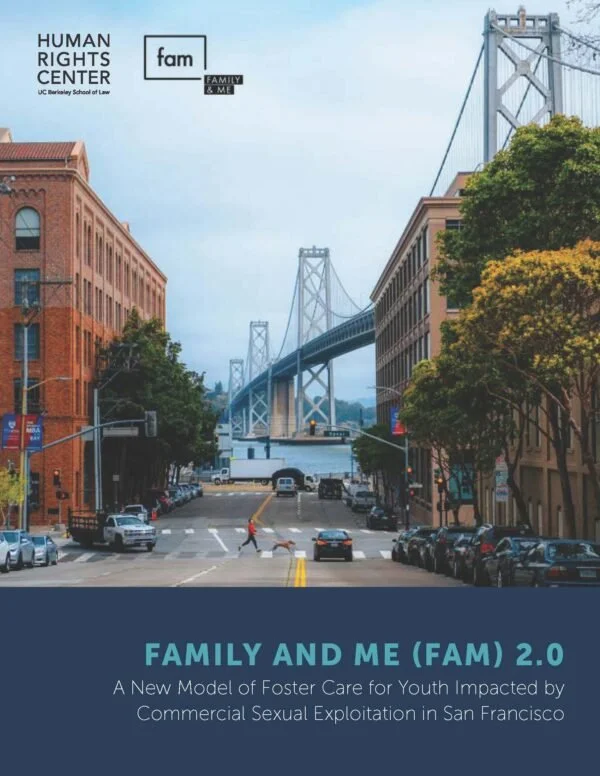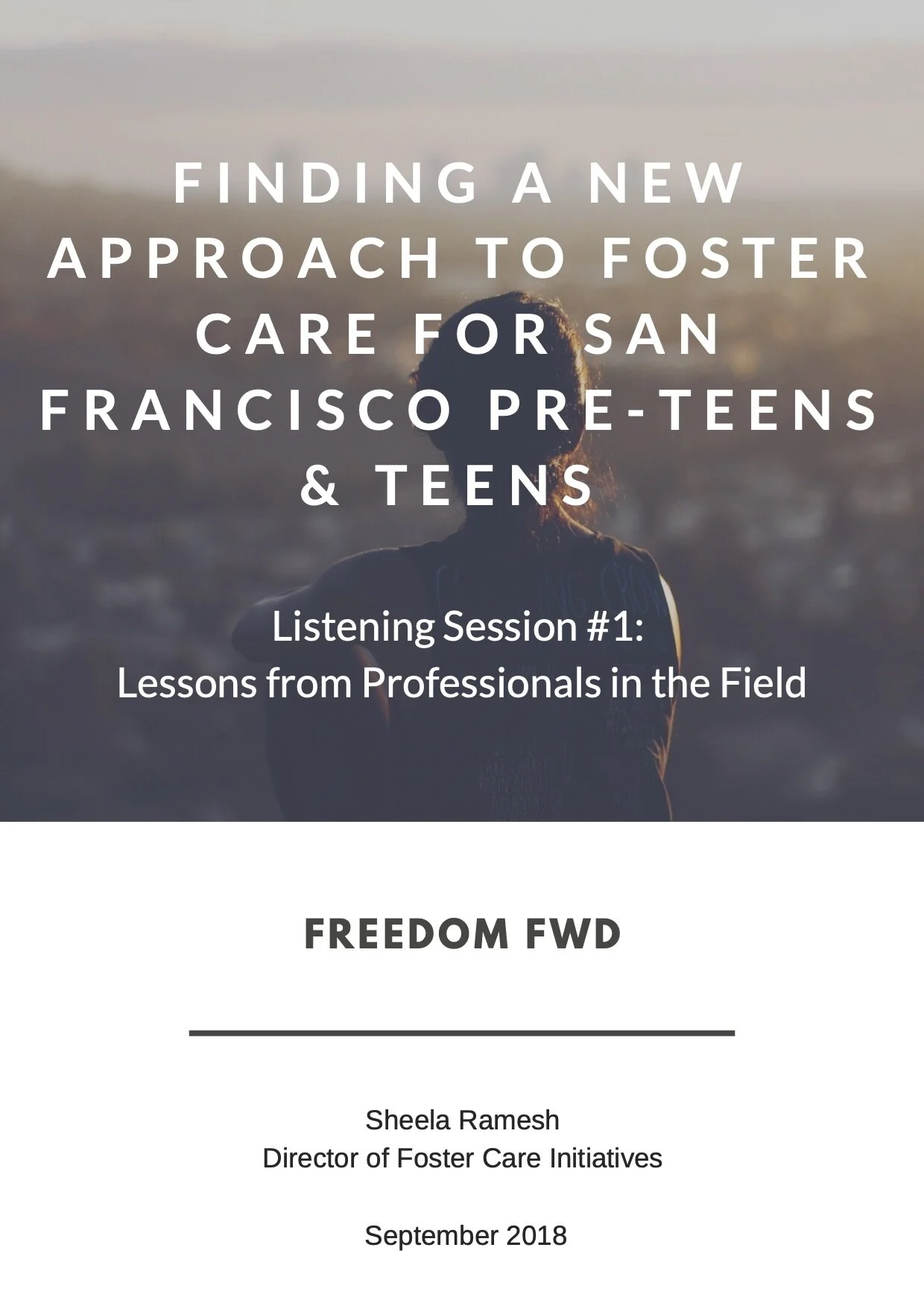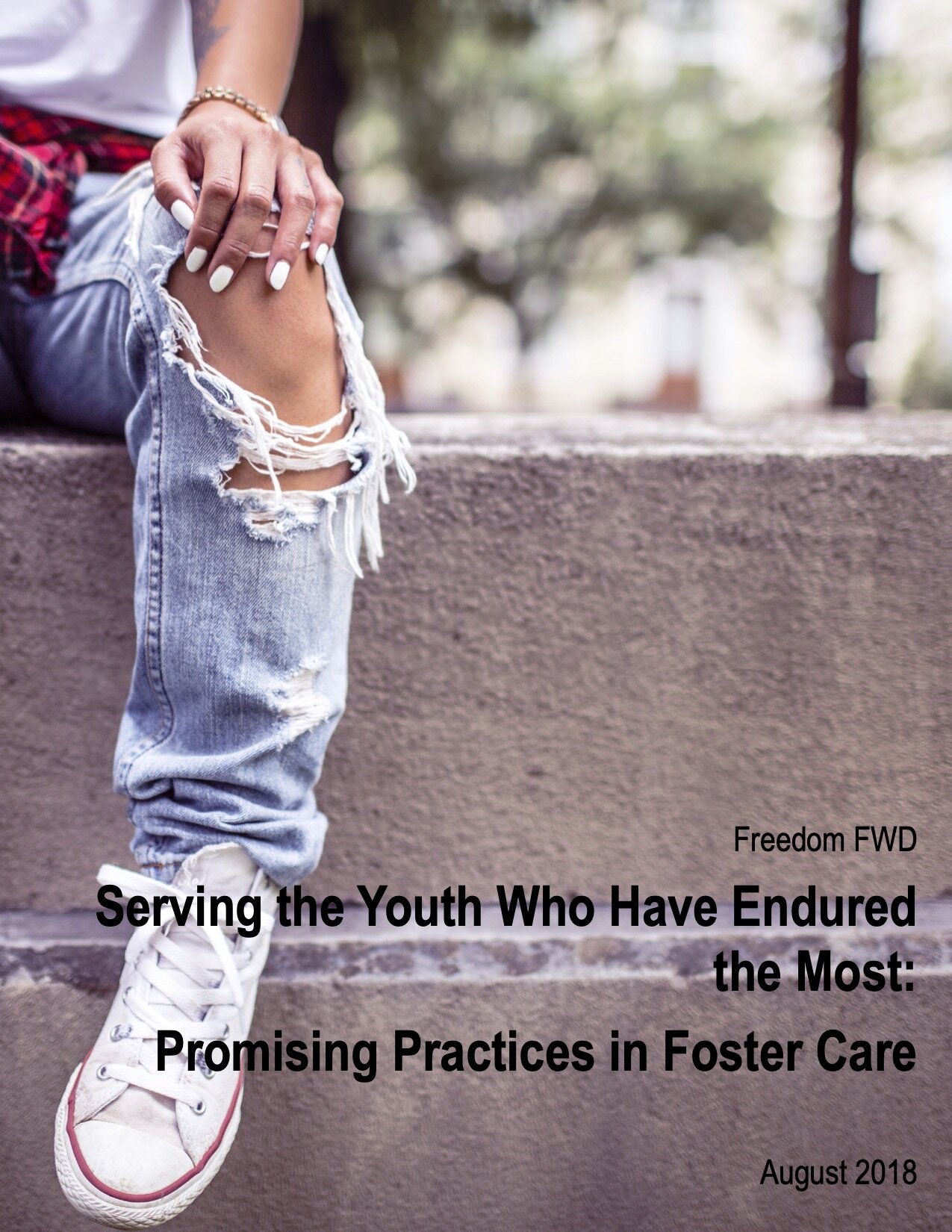WHAT WE’RE LEARNING
EVALUATION OF FAMILY AND ME (FAM): A NEW MODEL OF FOSTER CARE FOR YOUTH IMPACTED BY COMMERCIAL SEXUAL EXPLOITATION IN SAN FRANCISCO
The Berkeley Human Rights Center is conducting an external evaluation of our FAM model. Their reports offer recommendations to adapt and improve the model throughout pilot implementation. It is hoped that, when completed, the series will contribute to addressing gaps in the existing literature on the effectiveness of interventions to address CSE among youth and help to build a foundation of evidence-based practice.
FAM 2.0 Final Evaluation Report (Dec 2025) - Overall findings, outcomes, and lessons from the full FAM 2.0 pilot period.
FAM 2.0 Report 3 (Oct 2024) - Summarizes findings from Jan. - June 2024
FAM 2.0 Report 2 (Mar 2024) - Summarizes findings from July - Dec. 2023
FAM 2.0 Report 1 (Nov 2023) - Summarizes findings from Jan. - June 2023
FAM 1.0 Report 4 (Dec 2022) - Summarizes cumulative findings from initial pilot
FAM 1.0 Report 3 (May 2022) - Summarizes findings from Sept. 2021 – Feb. 2022
FAM 1.0 Report 2 (Nov 2021) - Summarizes findings from Mar. – Aug. 2021
FAM 1.0 Report 1 (May 2021) - Summarizes findings from July 2020 – Feb. 2021
host home survey
At the end of 2020, Launchpads contacted and surveyed 49 host home providers across the country in order to learn about their experiences, common practices, and pitfalls running programs pairing people seeking housing with hosts willing to share space in their homes. 26 programs responded. Their insights informed the development of Launchpads, and we hope they will be useful to others interested in learning about Launchpads or in host home programs more generally.
What Are youth Needs During COVID-19’s Shelter-In-Place?
Our HYPE Center team surveyed 100 youth ages 14 to 26 from July-October 2020 to determine how the shelter-in-place order as a result of COVID-19 had impacted them. Our findings demonstrate important information about the challenges youth are facing, the items youth need, and the services youth hope to see on the HYPE Center virtual service platform. By gathering this information, we were able to deliver the requested resources directly to young people. You can read a summary of the challenges youth are facing and items they need here.
LISTENING SESSION: LESSONS FROM FOSTER CAREGIVERS
Freedom Forward conducted a focus group in October 2018 to better understand the stated needs of foster caregivers, particularly those caring for teens, in order to refine our proposed pilot model to address those needs. The session was the first of several anticipated sessions with caregivers. At this first session were 3 participants, all of whom had current or prior experience as foster parents and caring for teenagers. The session was facilitated by Janay Eustace, a consultant with Youth Law Center’s Quality Parenting Initiative who is a former foster youth and who has built a career working with youth and adults on improving the foster care system. All participants were compensated for their time. The following includes both direct quotes and paraphrased summaries of the participants’ discussions about the question topics.
LISTENING SESSION: LESSONS FROM Youth
Freedom Forward conducted a focus group in October 2018 to better understand the stated needs of young people in foster care, in order to refine our proposed pilot model to address those needs. The session was the first of several anticipated sessions with youth and young adults. At this first session were 5 participants whose ages ranged from 14 to 24, all of whom had current or prior experience in foster care as teenagers. The session was facilitated by Janay Eustace, a consultant with Youth Law Center’s Quality Parenting Initiative who is a former foster youth herself and who has built a career working with youth and adults on improving the foster care system. The session was assisted by Ayanna Rasheed, Freedom Forward’s Youth Engagement Coordinator, who also participated in the focus group as a former foster youth herself. All participants were compensated for their time.
FINDING A New Approach to Foster Care For San Francisco Pre-Teens & Teens
Freedom Forward is planning to pilot a new model of family-based care and wraparound support for the San Francisco pre-teens and teens who have endured the most, and yet experienced the least stability. We know that our approach will be strongest if its design is informed and shaped by the key actors and stakeholders in our city and in the foster care system. We are therefore conducting a series of listening sessions with youth, caregivers, service providers, policymakers, and researchers to help drive the design and development of this innovative new model.
The first listening session took place on September 5, 2018 and included policymakers, providers, and other professionals grappling with these issues. This report summarizes the activities, discussions, and key takeaways from that session.
Serving the Youth Who Have Endured the Most: Promising Practices in Foster Care
Youth in foster care have, by definition, experienced abuse and neglect prior to entering care. During and after care, they often face additional abuse and challenges such as homelessness, physical and mental health issues, substance addiction, and exploitation. For example, multiple studies have found that a majority of youth who have experienced commercial sexual exploitation in San Francisco Bay Area have been touched by the foster care system. The system can do better to help alleviate and even prevent some of the disadvantages facing these youth, rather than exacerbate them.
Based on a comprehensive review of the national landscape, we have identified several programs with promising outcomes providing family-based care to this population of youth. This report provides a summary of the practices that seemed most effective in those programs.







